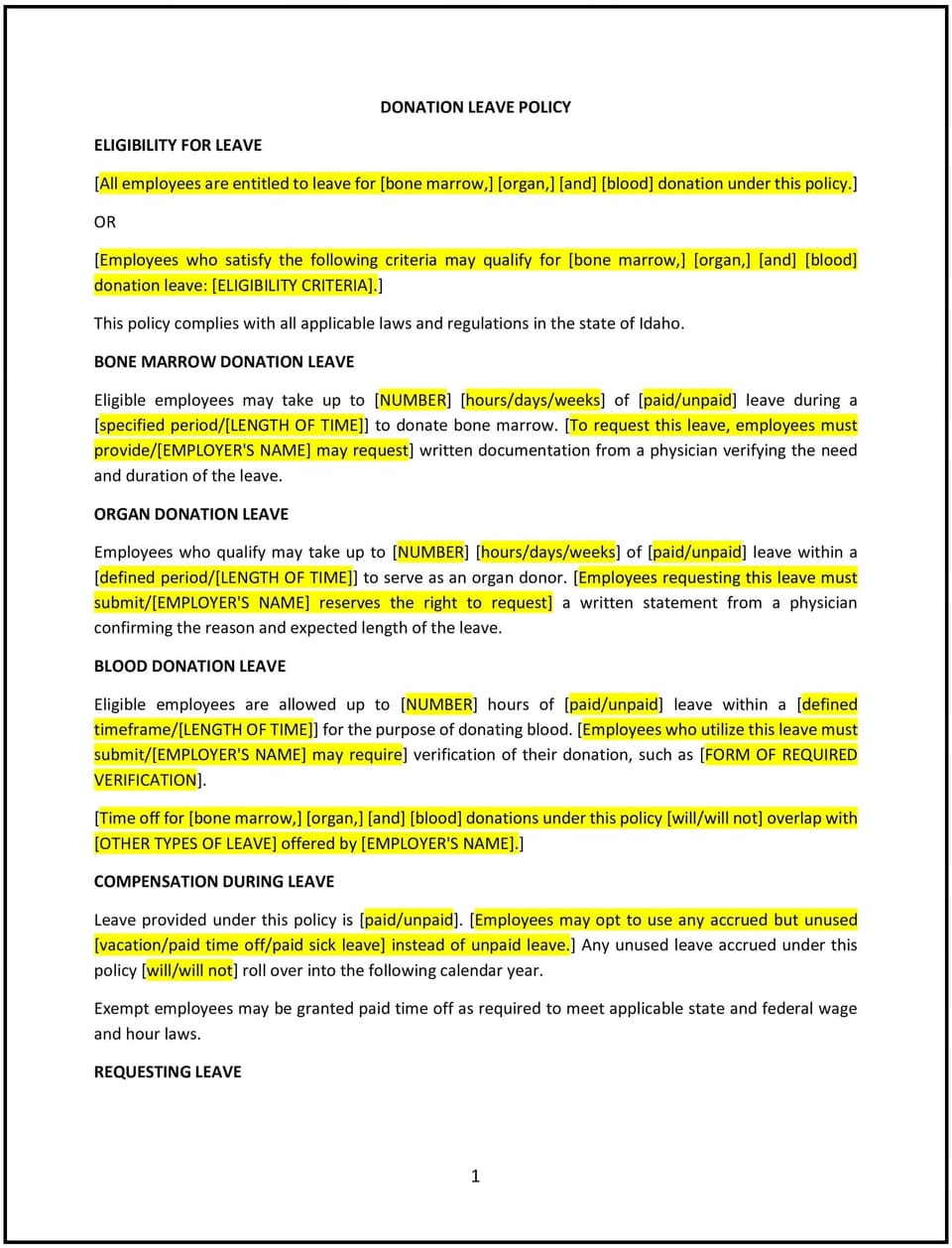Donation leave policy (Idaho): Free template

Donation leave policy (Idaho)
A donation leave policy helps Idaho businesses support employees who wish to donate time, resources, or services to charitable causes. This policy outlines the types of leave available for charitable activities, the approval process, and the expectations for employees during their absence. It reflects the business’s commitment to social responsibility and employee engagement in community service.
By implementing this policy, businesses can foster a culture of giving, enhance employee morale, and strengthen community relationships.
How to use this donation leave policy (Idaho)
- Define donation leave: Specify the types of charitable activities covered by the policy, such as volunteering, blood or organ donation, or participating in community events.
- Establish eligibility: Outline which employees are eligible for donation leave, such as full-time or part-time staff, and any tenure requirements.
- Set leave duration: Provide guidelines for the amount of leave employees can take for charitable activities, such as a set number of hours or days per year.
- Outline approval process: Describe the steps for requesting donation leave, including whom to notify, required documentation, and advance notice expectations.
- Address paid vs. unpaid leave: Clarify whether donation leave is paid or unpaid, and whether employees can use existing paid time off (PTO) for charitable activities.
- Communicate expectations: Ensure employees understand their responsibilities, such as coordinating their workload before taking leave and providing updates if needed.
- Review and update: Regularly review the policy to ensure it remains aligned with employee needs, business operations, and Idaho laws.
Benefits of using this donation leave policy (Idaho)
This policy provides numerous benefits for Idaho businesses:
- Encourages community involvement: The policy supports employees in contributing to charitable causes, fostering a sense of purpose and engagement.
- Enhances employee morale: Offering donation leave demonstrates the business’s commitment to social responsibility, improving employee satisfaction and loyalty.
- Builds community relationships: Employees’ participation in charitable activities can strengthen the business’s ties with the local community.
- Promotes a positive reputation: A donation leave policy can enhance the business’s reputation among customers, partners, and potential employees.
- Supports work-life balance: The policy allows employees to pursue meaningful activities outside of work, contributing to overall well-being.
- Aligns with corporate values: The policy reflects the business’s dedication to social responsibility and ethical practices.
- Encourages teamwork: Employees who participate in charitable activities together can build stronger relationships and improve collaboration.
Tips for using this donation leave policy (Idaho)
- Communicate the policy effectively: Share the policy with employees during onboarding, training sessions, and through internal communications to ensure awareness.
- Train managers: Ensure supervisors understand the policy and are equipped to handle donation leave requests with sensitivity and professionalism.
- Encourage participation: Highlight the benefits of donation leave and encourage employees to take advantage of the opportunity to give back to the community.
- Document requests: Maintain records of donation leave requests and approvals to ensure consistency and transparency.
- Provide resources: Offer employees information about local charitable organizations or events they can participate in during their leave.
- Review the policy regularly: Update the policy as needed to reflect changes in employee needs, business operations, or Idaho laws.
- Lead by example: Encourage leadership to participate in charitable activities and model the business’s commitment to social responsibility.
Q: Why should Idaho businesses have a donation leave policy?
A: A donation leave policy helps businesses support employee engagement in charitable activities, enhance morale, and strengthen community relationships.
Q: What types of charitable activities are covered under this policy?
A: The policy should cover activities such as volunteering, blood or organ donation, or participating in community events, as outlined in the policy.
Q: Who is eligible for donation leave?
A: Eligibility typically includes full-time or part-time employees, though specific criteria may vary based on the business’s practices.
Q: How much donation leave can employees take?
A: The policy should specify the amount of leave employees can take, such as a set number of hours or days per year.
Q: How should employees request donation leave?
A: Employees should follow the request procedures outlined in the policy, including notifying their supervisor and providing any required documentation.
Q: Is donation leave paid or unpaid?
A: Businesses should clarify whether donation leave is paid or unpaid, and whether employees can use existing PTO for charitable activities.
Q: How often should the policy be reviewed?
A: The policy should be reviewed annually or as needed to reflect changes in employee needs, business operations, or Idaho laws.
This article contains general legal information and does not contain legal advice. Cobrief is not a law firm or a substitute for an attorney or law firm. The law is complex and changes often. For legal advice, please ask a lawyer.


